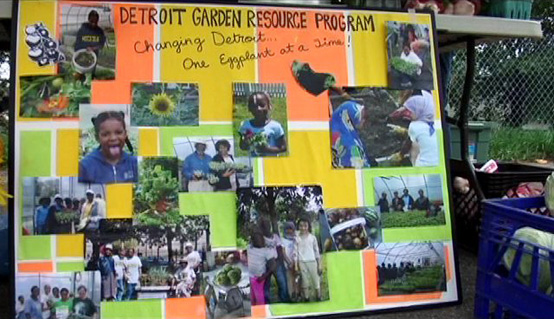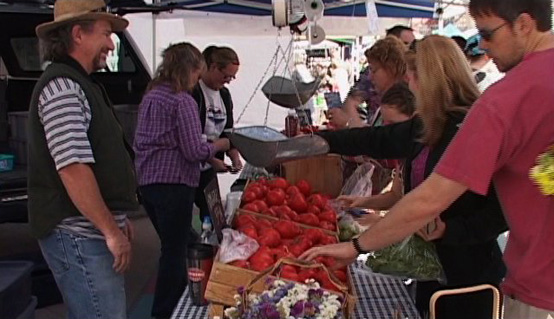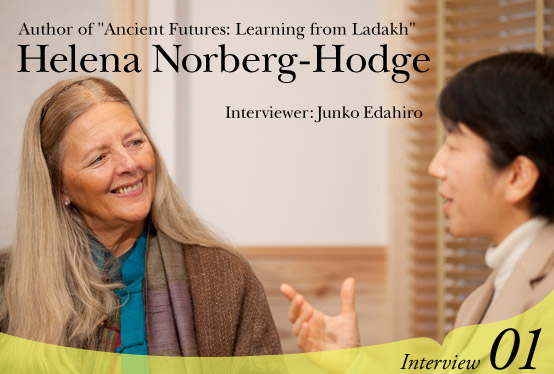- Junko :
- In the film, you actually show the big differences of harvest, large scale modern agriculture versus localized small scale one. Maybe one thing we have to do is to show these actual examples and data.
- Helena:
- Yes. It is very important to try to gather examples and the data, but when we do that, we have to be aware that these examples are struggling in an economic climate and social and structural climate where it is extremely difficult to do the right thing. Because almost everywhere, human labor for healthy production has become very expensive. We are becoming too expensive for ourselves to care for our children, to care for our sick or to care for our land because we are competing with machines that are subsidized.
- In Ladakh, every mother has about ten caretakers for every child. That human energy, to have the time to care for young child, is so important. Because that in turns, of course, creates a child that has been loved and cared in a way that makes them loving and caring. Restructuring that we need to do would have huge benefits for majority of us. I believe that the big problem is the big picture that would allow us to look back at some more traditional side and then look at some of the new localization initiatives.
- For instance in farming, despite all the pressures in the opposite direction, there are examples of farmers thriving when they are allowed to sell at your local farmer's market. The wonderful thing that is happening is that the market sends a signal that says, or even pressures farmers away from big monoculture to diversity. It is economically in their interest. The farmer in this situation is amazing, a miracle happens, because when they diversified, then the threat of wind or hail or fungus is not so great, because everything won't be attacked in a same way. So they don't need to use so many pesticides and chemicals. When they are in the shorter distances, they are getting paid much more then when they sell to a big middle man, sometimes by a factor of ten or even more. While they are getting paid more, the cost of production goes down, because they don't need to use so many inputs.
- Junko :
- Right. There is a very interesting story in Japan. As you may know the Japanese food self-sufficiency rate is very low, about 40% in caloric basis. But in Fukui, a small prefecture in Japan, which is in country side, far from Tokyo, the prefectural level of self-sufficiency ratio is very high, 60% or 70%.
- Helena:
- Yes.
- Junko :
- The reason behind that is that first of all, people tend to produce their own vegetables in their gardens. In Tokyo it is very difficult to have a garden, but in a country side, they can do. The second reason is very interesting. They give extra vegetables to their neighbors. This is not a formal economy. It is a kind of gift economy in a traditional sense. At the local level, this kind of localized, not mainstream economy is very viable. From the GDP point of view, they don't create value. But at local level, they create huge happiness and a connection to community.

From the documentary "The Economics of Happiness"
© 2011 "The Economics of Happiness"
- Helena:
- What I am talking about is the fundamental rethinking of what we mean by economic growth. When there is a great self-reliant population, the GDP goes down. We need to have a determinant of growth that is looking at this: How much food is being produced and consumed? Is it healthy food? Is there good shelter? Is there enough energy for heating, lighting and cooking? If we start measuring that, we would find growth that is very very different.
- Junko :
- Exactly.
- Helena:
- People need to understand that what is being measured is simply commercialization, and as I pointed out it is connected to a loss of self-respect and happiness.
- Junko :
- Yes.
- Helena:
- We realize that it is unpatriotic to stay healthy, because if we want GDP to go up, we should be ill most of the time. We have to take medicine, chemotherapy, radiation. We have to have a long but very very ill life. We shouldn't grow even a flower, because we should go out and buy everything. If we have a garden and grow some of our vegetables, the GDP will not go up. In reality, the fact is that war is very good for GDP. Every house has to be rebuilt, and this is considered progress.
- Another example is that it is good for business and GDP if we are so polluted, for instance, that we need drinking water from bottles, filters and all kinds of technologies to clean up. In many cases, it is cleaning up pollution that should not have been there in the first place.
- The other part of this, which is very important as part of economic literacy is that the prices that we currently have within this imprisoned economic market, the labor for right work, is too expensive. We realise that the natural product that doesn't have all kinds of processes, chemicals, colors, packaging, and transportation miles, costs more than the processed things from the other side of the world. This is the reflection of hidden subsidies and manipulations. It is not cheaper to have a potato from the other side of the world that has been made into powder and into potato crisps, then colored and triple wrapped and sent across the world. That would cost less than fresh local organic potatoes. This is a completely false and manipulated economy. So there is a quite a lot to rethink in terms of becoming economically literate.
- Junko :
- First of all, we have to make a clear distinction of country-measured GDP and real economic growth. I think many people are accustomed to think economic growth as GDP. It is very confusing.
- Helena:
- For me, it was very clear, the reason why I have been promoting decentralization and localization is that in a local town or village, people would never make a mistake of considering their pond polluted as an indicator of progress. They would never think that having half the village have no work is progress. When you get closer to the reality, to the land, and it's people who are affected, you suddenly get common sense. Reality measures. It is insanity that we have the GDP because it is an abstraction and it is so far removed from the reality of nature and people.
- I think there could be a type of people's measure in the local level to measure real progress and real growth. I am also very interested in promoting the idea of growth in the number of businesses, rather than shrinking. Mega mergers, the biggest of company merging with the next biggest. These giants become far too big and inefficient, and too powerful; instead we should be splitting work on some kind of meaningful scale that makes sense for society. What is very obvious is something like food. We should be looking at having it as close to home as possible, as reasonable.
- There are so many areas basically where the growth in real prosperity is going to include de-commercialization, because there will be more exchange.
- I don't advocate talking about the need to move away from money completely, because money is a useful tool. And certainly it is a good idea to have a certain level of taxation so that there is a collective way of helping the aged and poor. But what I saw in Sweden where I grew up is that when a national state becomes too top-heavy, it takes away too many of the functions from family and community. That reduces happiness.

From the documentary "The Economics of Happiness"
© 2011 "The Economics of Happiness"





